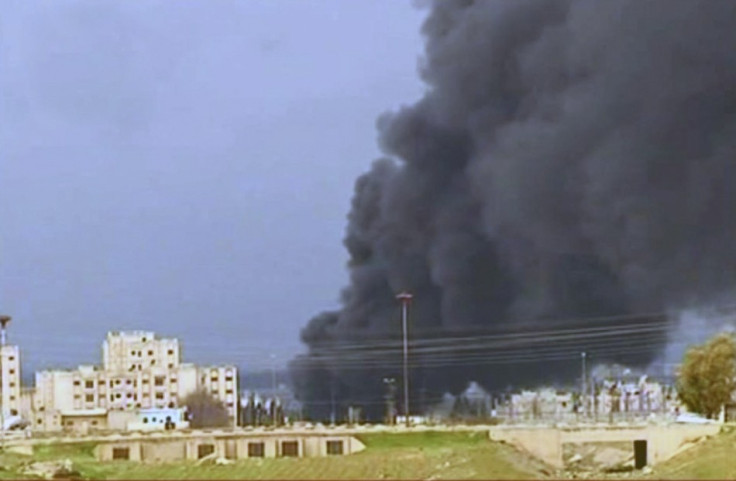Syria Killings Continue as Red Cross Seeks Truce

(Reuters) - Syrian government forces have killed at least 100 people in assaults on villages and an artillery barrage on the restive city of Homs as the Red Cross called for daily ceasefires to allow in urgently needed aid.
Washington, which is preparing for a "Friends of Syria" meeting of Western and Arab states opposing President Bashar al-Assad, declined to rule out eventually providing arms to rebels.
UN chief Ban Ki-moon said he was searching for a candidate to name as a humanitarian coordinator for Syria, whose role could evolve into seeking a political solution to the conflict.
Security forces killed at least 100 people in attacks on Homs and raids on villages and towns in the province of Idlib near Turkey, the Local Coordination Committees said.
Ten children and three women were among the dead, the opposition activists' organisation, which documents what it describes as killings and human rights abuses by security forces, said.
In Damascus, security forces opened fire on demonstrators overnight, wounding at least four, activists said. Violence has hit the capital over the past week, undermining Assad's assertion that the 11-month-old uprising against his rule is limited to the provinces and the work of saboteurs.
Activist accounts of the violence could not be confirmed. The government bars most foreign journalists from Syria.
The International Committee of the Red Cross said it had asked authorities and rebels to agree daily ceasefires so life-saving aid can reach civilians in hard-hit areas including Homs.
"It should last at least two hours every day, so that ICRC staff and Syrian Arab Red Crescent volunteers have enough time to deliver aid and evacuate the wounded and the sick," ICRC President Jakob Kellenberger said.
Western and Arab powers that are openly seeking Assad's downfall are preparing for the inaugural meeting of a "Friends of Syria" contact group in Tunisia on Friday.
Asked about the prospect of arming the rebels, US State Department spokeswoman Victoria Nuland said: "We don't believe that it makes sense to contribute now to the further militarisation of Syria."
But she added: "If we can't get Assad to yield to the pressure that we are all bringing to bear, we may have to consider additional measures."
Russia and China back Assad's own programme for reforms, which includes plans for a referendum on Sunday on a new constitution which would lead to elections in 90 days. Assad says this should satisfy demands for more democracy; his opponents say the proposals are a sham.
Russia said it would not attend the Friends of Syria meeting because the Syrian government would not be represented. Lebanon, which has tried to distance itself from the turmoil across its border, will also stay away from the Tunis meeting.
Russia and China have faced Western and Arab criticism for blocking UN action against Syria. A former Syrian Defence Ministry auditor who defected in January told Reuters Moscow's arms sales to Damascus - nearly $1bn last year - had increased sharply since the start of the uprising.
Ban said he was urgently contacting prospective candidates for the role of UN humanitarian co-ordinator for Syria. Russia said it would support a UN humanitarian envoy.
Activists said government forces launched the artillery attack on Homs after rebel fighters holding the opposition Baba Amro district blocked troops from entering.
"Several shells are falling each minute," activist Nader al-Husseini said.
The British-based opposition Syrian Observatory for Human Rights said security forces had stormed villages in Idlib province in the north of the country.
Activists in Homs said government forces backed by armour have been closing in on Baba Amro, a mainly Sunni Muslim neighborhood, since the offensive on the city began on Feb 3.
Much of the opposition to Assad comes from the Sunni majority, while much of his support comes from minorities including his Alawite sect, raising worries that violence could take on a sectarian slant and draw in neighboring countries.
Tanks are deployed in the Inshaat district next to Baba Amro, opposition sources said. The Observatory said a convoy of more than 50 armored vehicles was seen heading from Damascus towards Homs.
A city of one million people on the Damascus-Aleppo highway, Homs has been at the heart of the uprising against Assad's 11-year rule. Residents say they are running short of medicine and food, and are massed together in crowded homes to seek shelter.
Government curbs on access make it hard to verify details of fighting there but international rights and aid organizations say hundreds of people have been killed in recent weeks in Homs.
Assad says the revolt is the work of foreign-backed terrorists. Until recently it was limited mainly to the provinces, but anti-government rallies have drawn crowds in Damascus in recent days. On Monday night at least four people were wounded when security forces opened fire, activists said.
Elsewhere, an activist group in Kfar Tkharim near the Turkish border said rebel fighters had killed five soldiers and captured two in an ambush on a government column.
An activist in al-Qusair, about 32km (20 miles) southwest of Homs and close to the Lebanese border, said five people were killed and eight wounded when the northern part of the town came under heavy fire from army mortars and T-72 tanks.
"People in that area are hiding in their homes, they can't leave. Others are resisting. Those who are farther away are fleeing the town. Some people are so scared they're trying to leave anyway even if they are close to the fire," Abu Ansa told Reuters by telephone.
Activists in the western city of Hama said troops, police and militias had set up dozens of roadblocks, cutting neighbourhoods off from each other.
© Copyright IBTimes 2025. All rights reserved.




















